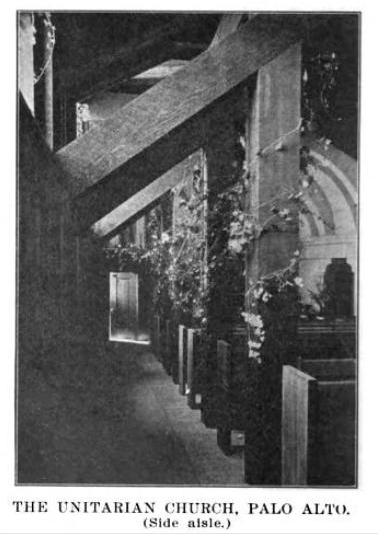A continuation of a documentary history of the Unitarian Church of Palo Alto.
After the departure of Rev. Bradley Gilman, the congregation managed to get back on its feet, first with no minister, then with the experienced leadership of Rev. Elmo Arnold Robinson, a Universalist minister. But the financial situation worsened through the late 1920s, the congregation began to decline, and the Great Depression made it impossible to continue.
An Experiment in Palo Alto (1920)
[In the previous post, the excerpt from Josephine Duveneck’s autobiography told how the relationship between Rev. Bradley Gilman and the congregation grew strained. It is worth noting that Palo Alto was the last congregation that Gilman served. This chapter begins with an explanation of how the Palo Alto church experimented at having an entirely lay-led congregation. Edith Mirrielees asserts that the reasons for not hiring a minister were not financial, leaving us to conclude that Bradley Gilman soured the congregation on ministers.]
The Unitarian church in Palo Alto was established in 1905. From its establishment until the autumn of 1919, the church followed the way of most Unitarian churches, retaining a resident minister and supporting him with an enthusiasm that waxed or waned according to the circumstances surrounding the individual pastorate.
In May, 1919, the Rev. Bradley Gilman, at that time the incumbent, left Palo Alto for a visit to the Eastern coast. Some months later he sent in his resignation. When the congregation came together to consider the resignation, many of its members felt unwilling to begin the search for a new minister until an experiment had been made in conducting the church in another manner. For some years there had been a growing conviction among members of the Unitarian Society in Palo Alto that the presence of a professional minister was not necessarily essential to the continuance of their church or to its welfare, and after thorough discussion in congregational meeting it was determined to do without one, the pulpit to be tilled by members of the congregation and community or by visiting Unitarians. the other duties of the pastorate to be assumed by the congregation. It is worth noting that this decision was not reached because of money difficulties. The church at this time, though by no means wealthy, was in sound financial condition, without debt and with as many contributors as it had had during the previous year when a minister had been in residence. It should be noted, too, that the essential Unitarianism of the church is in no way affected by the change; the congregation is a congregation of Unitarians, but one wherein congregational government and responsibility is now carried a step farther than it has been before.
The attempt was at first frankly experimental. After four months of trial, it seems so far to have justified itself that there is at present no probability of a return to earlier conditions. Throughout the winter months, the pulpit has been regularly filled, often by speakers with a notable message, membership in the church and attendance at services have both materially increased, money has come in in quantity sufficient to meet all obligations and to make possible the establishment for next year of a scholarship at Stanford University, which it is the hope of the congregation to continue from year to year.
Rut these things, though they are encouraging, are only the outside results of the experiment. More important than any one of them is the effect of the change upon the relation of members of the congregation to the church and to each other. A new unity of purpose, an increased sense of fellowship, has been the most promising growth of the last few months. The presentation from the pulpit of many points of view 1ms promoted that tolerance essentially dear to Unitarians. The necessary sharing of responsibility has, as it is likely to do, increased the willingness to take responsibility. It goes without saying that the work has not been equally shared; as is the case in practically every congregation, one or two members have carried the heaviest part of the burden, but in very considerable number — a number much larger than was normally found under the old condition — have taken some part, with a resultant growth in actual neighborliness and interdependence.
It is by no means the thought of the Unitarian Society in Palo Alto that other bodies of Unitarians would necessarily be wise to follow in their footsteps. For any congregation, the wisdom or unwisdom [sic] of such an attempt depends upon the nature of the community in which the church is situated. It has to be a community which provides a fair number of thoughtful speakers; it has to be a congregation blessed with at least one member ready steadfastly to put the church’s welfare before his own, and neither of these things is easy to find. For Palo Alto, however, the experiment thus far has been promising enough to justify its further trial.
— Edith R. Mirrielees, The Pacific Unitarian (San Francisco: Pacific Unitarian Conference), vol. 29, no. 5, May, 1920, p. 125.
[Note: Mirrielees was professor of creative writing at Stanford, and a teacher of John Steinbeck (Jeffrey Schulz and Luchen Li, Critical Companion to John Steinbeck [Facts of File: 2005), p. 301.]

